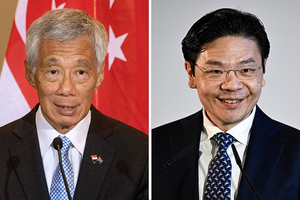Singapore’s New PM Takes Office Pledging to Build Better Tomorrow
Listen to the full version

Lawrence Wong, Singapore’s new Prime Minister, was sworn in Wednesday as its fourth premier since independence, vowing to make “tomorrow better than today” in the city state and financial hub at a strategic crossroads in Southeast Asia.
Wong, 51, becomes Singapore’s fourth premier since independence, succeeding Lee Hsien Loong, the 72-year-old son of Lee Kuan Yew, the founder of modern Singapore. Wong is the first Singaporean premier born after its independence in 1965.

Unlock exclusive discounts with a Caixin group subscription — ideal for teams and organizations.
Subscribe to both Caixin Global and The Wall Street Journal — for the price of one.
- DIGEST HUB
- Lawrence Wong, 51, was sworn in as Singapore's fourth Prime Minister, succeeding Lee Hsien Loong, and is the first premier born after independence.
- Wong aims to engage younger Singaporeans in governance, maintain regional cooperation, and adapt Singapore's economy amid global challenges.
- Wong's leadership approach will balance continuity with innovation, focusing on an inclusive society, government stability, and preparing for the 2025 general election.
Lawrence Wong, at 51, has been sworn in as Singapore’s new prime minister, marking a significant generational transition in leadership. This event is notable as Wong is the first premier born post-independence in 1965 and takes over from Lee Hsien Loong, the 72-year-old son of Singapore’s founding father, Lee Kuan Yew [para. 1][para. 2]. Wong emphasized this generational shift in his inauguration speech delivered in Malay, Mandarin, and English, highlighting it not just as a change in leadership but a significant milestone for the country [para. 3].
Faced with a challenging international landscape marked by conflicts, protectionism, and nationalism, Wong promised to adapt and maintain friendly relations with all countries, while valuing ASEAN's central role in regional cooperation [para. 4][para. 5]. He expressed hope for stable U.S.-China relations and committed to actively engaging with both powers despite inevitable issues [para. 6].
Acknowledging the contributions of his predecessors, Wong signified his intention to lead differently by continuing to think boldly and creatively, while also innovatively addressing the needs of the era [para. 7]. Former Premier Lee Hsien Loong will remain in the cabinet as a senior minister, in line with the tradition followed by all previous premiers [para. 8]. Wong identified enlisting younger Singaporeans in their 30s and 40s for governmental roles as one of his primary objectives [para. 9]. He stressed the importance of ongoing economic dynamism and underscored the necessity of maintaining tripartite cooperation among employers, workers, and the government [para. 10].
Wong aims to keep making Singapore a more innovative, fairer, and egalitarian society for its 5.9 million citizens. Highlighting Singapore’s increasing diversity, he pledged that his government would ensure inclusion, respect, and value for every community, religion, and linguistic group in the nation [para. 11][para. 12]. Born in 1972, Wong boasts an impressive educational background with degrees from the University of Wisconsin, the University of Michigan, and Harvard University. Before entering politics, he served in various government departments and was the principal private secretary to Lee Hsien Loong between 2005 and 2008 [para. 14].
Wong transitioned from civil service to politics in 2011 under Lee’s encouragement, subsequently holding ministerial roles in culture, national development, and education before becoming the presumed next prime minister in April 2022 [para. 19]. Wong co-chaired a multi-ministry task force during the Covid-19 pandemic, earning praise for his effective handling of the crisis [para. 18][para. 19]. Wong will lead the ruling People’s Action Party in the next general election in 2025. In the 2020 election, the party won 61.24% of the votes, capturing 83 out of 93 seats in the parliament [para. 20].
Wong announced his cabinet lineup on Monday to ensure a smooth transition, hinting at significant cabinet reshuffles post the 2025 general election. His current leadership includes two deputy prime ministers: Trade and Industry Minister Gan Kim Yong and Heng Swee Keat [para. 21][para. 22]. Heng had stepped aside in 2021 to pave the way for a younger successor [para. 24]. This strategic appointment reflects Wong’s reliance on experienced colleagues while avoiding hierarchy formation among his fourth-generation peers [para. 25]. Wong will continue serving as the finance minister, a role he has held since 2021 [para. 26]. President Tharman Shanmugaratnam praised the smooth leadership transition, underscoring the new cabinet's capability to safeguard national interests and promote ASEAN unity amid geopolitical uncertainties [para. 27][para. 28].
- PODCAST
- MOST POPULAR






